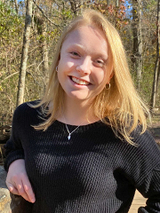Morgan’s Story: Overcoming Brain Injury After Ischemic Stroke
Morgan’s Story: Overcoming Brain Injury After Ischemic Stroke
“All of us are absolutely amazed,” says Leeanne of her daughter Morgan’s recovery from a stroke at the age of 15. After just a year of care and support from CHOP’s Pediatric Stroke Program and Rehabilitation Day Hospital Program, Morgan has regained her ability to speak and is back to doing the sports she loves.
Everyone will agree that 2020 was a year like no other. Morgan and her family will certainly never forget it, but not as much because of the COVID-19 pandemic as Morgan’s sudden health crisis.

On New Year’s Eve, while most people were gleefully bidding adieu to 2019 and ringing in 2020 unaware of the coming pandemic, Morgan and her parents were in the Emergency Department at Children’s Hospital of Philadelphia (CHOP). Earlier that day at swim practice at her school in Souderton, Pa., Morgan suddenly had trouble getting her words out. She also felt light-headed and nauseous, and her arm went numb.
Morgan had felt this way a few times before while swimming and playing water polo. The other times it happened, the feeling lasted less than a minute and she regained her speech quickly after drinking some water.
“Being a swimmer, it’s easy to get dehydrated,” says Morgan’s mother, Leeanne. “When you’re in the water, you don’t know how much you’re perspiring. You are sweating, but you don’t feel it because you are already wet. And Morgan’s practices are pretty intense; they can last up to three hours a day.”
But that day, even after drinking water and eating some food, Morgan didn’t regain the ability to speak clearly.
From urgent care to hospitalization to rehabilitation
The family rushed to CHOP’s Urgent Care Center in King of Prussia, where doctors quickly determined something serious was going on with Morgan. They instructed the family to go to CHOP’s hospital in Philadelphia immediately for a comprehensive neurological assessment.
An MRI at CHOP revealed Morgan had experienced an arterial ischemic stroke (AIS).
About arterial ischemic stroke (AIS)
She was admitted to the hospital and prescribed blood-thinning medication. Over the next few days, she underwent a full battery of neurological tests to determine what caused the stroke, but it was difficult to determine conclusively.
Regaining speech skills
After discharge from the hospital, Morgan began intensive outpatient speech-language therapy and occupational therapy through CHOP’s Rehabilitation Day Hospital Program to relearn the language skills she had lost due to the stroke. Academics, like athletics, had always come easily to Morgan, so it was frustrating for her to suddenly struggle with things like reading. She saw that she’d have to work harder than ever to regain the abilities she had before the stroke.
“I cried every day,” she says.
She was also devastated to learn from her care team at CHOP that she might never be able to swim competitively or play water polo again, due to the blood thinners and the risks of bleeding out if she was injured.
“As a parent, it was so hard to watch her break down over losing the things she loves and excels at,” says Leeanne. “There were hard times. You cry, you yell, you scream, you say, ‘why?’ But as a family, we had to stay strong and be there to support Morgan.”
After three weeks of therapy, Morgan had made a lot of progress, and an MRI showed her brain was healing well. She was able to return to school, which by that time had been pushed online due to the COVID-19 pandemic. For the first time in her life, Morgan needed an individualized education plan (IEP). The experience gave her a new appreciation for the challenges some of her peers had with learning.
Back in the pool
Morgan was fiercely committed to doing all she could to get back to her sports. She began working out and resolved that if she was ever allowed to swim competitively again, she would be stronger and better than ever.

In the summer of 2020, her recovery was going so well that she was taken off the blood thinner and permitted to swim, albeit with some restrictions.
“It felt good to get back into the pool,” she says. “I was scared at first, but my teammates and coaches were incredible and really helped me overcome my fear.”
In the fall of 2020, Morgan’s school reopened for in-person learning. Just a sophomore, she tried out for and amazingly made the varsity water polo team. She also made the varsity swim team in the winter and had her best season ever. Her school supported her return to sports by making an action plan in the event she had a stroke again.
Sharing her story to inspire others
Morgan, 16, recently graduated from speech therapy. And at her latest follow-up appointment with her team in CHOP’s Pediatric Stroke Program, she was cleared for all physical activity except deadlifting. Hearing that news, just a year after her stroke and subsequent setbacks, gave Morgan a huge sense of accomplishment.
It made me realize that things are possible even if you don’t think they are,” she says. “Hearing that I had a ‘stroke’ was very scary, being just 15.
"I had a very hard time coping with everything. It was a lot in a small amount of time. I want others to know that even if something traumatic happens, if you want to get your life back, you can do it."